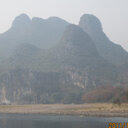[Treating Cancer-related Fatigue after Chemotherapy in Lung Cancer Patients by Yiqi Jianpi Recipe: a Clinical Study].
Słowa kluczowe
Abstrakcyjny
OBJECTIVE
To evaluate the clinical efficacy of Yiqi Jianpi Recipe (YJR) in treating cancer-related fatigue (CRF) after chemotherapy in lung cancer patients. Methods Totally 124 lung cancer patients were assigned to the treatment group (63 cases) and the control group (61 cases) according to random digit table. All patients received pre-set chemotherapy regimens according their conditions. Patients in the treatment group took YJR Decoction from the 1st day of chemotherapy, one dose per day for 2 successive weeks, while those in the control group took no Chinese medical decoction. Changes of each dimensional scoring and the total scoring were observed by cancer fatigue scale (CFS) in the two groups one day before chemotherapy, on the 3rd day and the 14th day after chemotherapy. The degree of bone marrow depression and recombinant human granulocyte colony-stimulating factor (rhG-CFS) doses were also observed after chemotherapy.
RESULTS
Compared with one day before chemotherapy in the same group, scorings for emotional, perceptional, and somatologic dimensions, and the total scoring significantly increased on the 3rd day in the treatment group, as well as on the 3rd and the 14th day in the control group (P <0. 01). Scorings for emotional, perceptional, and somatologic dimensions, and the total scoring significantly decreased more at the fourteenth day after chemotherapy than at the 3rd day after chemotherapy (P <0. 01). There was statistical difference in the scoring for perceptional dimension at day 3 between the treatment group and the control group (P <0.01). However, scorings for emotional, perceptional, and somatologic dimensions, and the total scoring significantly decreased more at the fourteenth day after chemotherapy in the treatment group, with statistical difference when compared with those in the control group (P <0. 01). The occurrence rate of bone marrow depression was 70. 97% (44/62) in the treatment group and 68. 85% (42/61) in the control group. There was no significant difference in the occurrence rate between the two groups (χ2=0. 540, P >0.05). There was no statistical difference in rhG-CFS doses between the two groups (χ2=0. 696, P >0. 05).
CONCLUSIONS
YJD could significantly relieve CRF after chemotherapy in lung cancer patients, and obviously attenuate the effect of CRF on their daily life.


